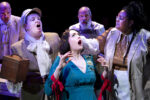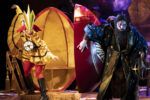Faust (Royal Opera) – Review – Showcase Cinema de Lux, Leeds (Satellite Screening)
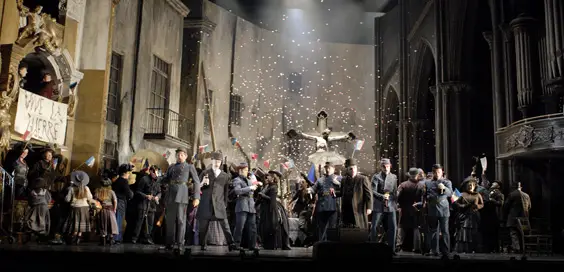
By Eve Luddington, May 2019
The medieval Faust legend tells of a man who sells his soul to the devil for eternity, in return for earthly pleasures while he lives. It has given birth to many artistic works. In this, Gounod’s opera of 1859 which is based on a play by Goethe, Faust is a fragile old man who’s had academic success but has failed in love. He trades his soul for one last taste of youth and its sensuous delights. And so, with Mephistopheles’ support, he seduces the young and innocent Marguerite, whom he impregnates then deserts. His eventual remorse cannot save him.
Faust is, at heart, a domestic drama with supernatural elements. Gounod endows it with a vast and impressive range of ‘musical costumes’ as the conductor, Dan Ettinger, puts it – from the theatrical to the ecclesiastical, from the soft and elegant to the punchy and melodramatic. To please Victorian opera convention, Gounod even added a ballet. The score shows to wonderful effect his ability to compose equally well in many different genres.
The production is set in 19th century wartime Paris. Originally directed by David McVicar, Bruno Ravella directs this, its fifth revival. The Royal Opera’s budget and McVicar’s vision make for a grand affair, with lavish sets and spectacular scenes. I’ve not seen Gounod’s Faust before so can’t make comparisons. What struck me most forcefully at first, other than the music, was the contrast between the great attraction of sensual pleasure and the lesser appeal of Godly devotion and duty.
“Oozes charisma”
Charles Edwards’ set design makes the most of this basic dichotomy. We’re taken to a cabaret where costume design echoes Toulouse Lautrec’s ‘Moulin Rouge’ posters, to a street, a church, a town square – and finally to a prison. Most significantly, there’s a large church organ on one side and a theatre box on the other, set above a large trunk which contains Mephistopheles’ box of tricks. Costume design by Brigitte Reiffenstuel reflects imaginatively the juxtaposition of workaday ‘righteous’ life and the glitzy allure of devilry.
With Erwin Schrott as Mephistopheles, it’s difficult not to fall for the Devil’s ways. Emerging from below in a waft of red smoke, he oozes charisma from the start. His bass voice is velvety and enticing, his stance assured and elegant and, with amusement in his eyes, he teasingly ensnares Faust. Soon, he joins the flag-waving townsfolk who are celebrating a battle victory and has them dancing, literally, to his tune in a rousing chorus to the golden calf (‘Le Veau d’Or’).
A couple of children casually kick a lifeless body and the figure of Christ falls from the crucifix. The theatre audience suddenly realise the dangers of this creature but the citizens and soldiers have been seduced: Mephistopheles, in dashing scarlet outfit, is on a roll. As the story darkens, so does Schrott’s characterisation of a deeply malign force. His portrayal reminded me of populist politicians who use their appeal to manipulate emotions, to gain votes and power. It’s a wonderfully judged performance.
“Awe-inspiring piece”
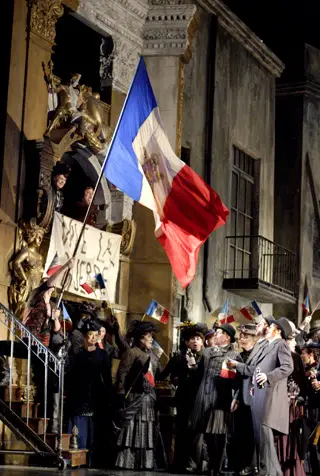 Michael Fabiano’s Faust is, until the final scenes, rather less conflicted than I’d expect of someone so acutely aware of his ultimate fate but he works well with Schrott and plays his feelings towards Marguerite with strong focus and intensity. His tenor voice is powerful yet flexible, bringing emotional nuances to his character which are sometimes lacking in his acting. He gives a beautifully sensitive rendition of the romantic, ‘Salut Demeure Chaste et Pure’ when he’s just begun to pursue Marguerite in earnest.
Michael Fabiano’s Faust is, until the final scenes, rather less conflicted than I’d expect of someone so acutely aware of his ultimate fate but he works well with Schrott and plays his feelings towards Marguerite with strong focus and intensity. His tenor voice is powerful yet flexible, bringing emotional nuances to his character which are sometimes lacking in his acting. He gives a beautifully sensitive rendition of the romantic, ‘Salut Demeure Chaste et Pure’ when he’s just begun to pursue Marguerite in earnest.
Irina Lungu is another world-class singer, a soprano with an attractive, shimmering voice. As Marguerite, she seemed to me less innocent than the pure young lass described in the opera, so her sexual awakening to Faust hadn’t the impact it might. It’s a pity she has a tendency to sing to the audience rather than to her lover. I wonder if her interpretation of character was restricted by very limited rehearsal time: Lungu, who’s never before sung this role in a full production, was brought in at late notice when the original ‘Marguerite’ slipped her disc – and she herself missed the first night because of a throat infection. She truly comes into her own in later scenes when Marguerite is pregnant, undone and crazed with despair, begging God to save her.
The other lead singers are all effective in role and strong in voice. Stephane Degout plays Valentin, the upright, incorruptible and judgemental brother of Marguerite. Her honest and decent paramour, Siebel, is performed with conviction by Marte Fontanalas-Simmons in a trouser role, while Carole Wilson gives a wonderfully comic portrayal of Marthe, the overdressed frump who fawns on Mephistopheles.
In an all-round production of excellence, the church scene is outstanding. Gounod’s ecclesiastical organ music is a slow, awe-inspiring piece. It is played by Faust while the pregnant Marguerite tries to pray in front of a statue (‘Seigneur, Daignez Permettre’), and church goers parade past, singing in sombre tones to God. But the statue comes to life; it is, in fact, Mephistopheles – who silences the organ and with his own dark, haunting voice, invokes his devil minions who wreck Marguerite’s devotions by tormenting her. The interpretation and execution of the scene brings out all the terrifying implications of Satan entering the house of God.
“Intensity and sensitivity”
The last of five Acts starts on Walpurgis Night, 30 April, when – according to some European traditions – the darkness and evil of winter are eventually banished and witches take flight. The ballet in it, actually a parody of ballet, is a shocking highlight of this production. Mephistopheles holds court in a sequined black dress, a design triumph which suits brilliantly Schrott’s portrayal. The dancers, in white tutus, seem the epitome of purity at first but they slither into licentiousness and orgiastic revelry. The last scene too, a final battle between God’s will and the Devil’s, is memorable. Here, the music reaches a crashing crescendo before lapsing into thoughtful, slow chords and silence.
I’m no great judge of musical excellence but it seemed to me that the conductor, Dan Ellinger, drives the orchestra and singers with an intensity and sensitivity which brings the best out of Gounod’s wide-ranging and highly emotive score.
With a running time of nearly three-and-a-half hours, this Faust is, by turns, thrilling and shocking, touching and bold. I admired the performance greatly but, sadly, it didn’t wring my withers. As the performers took their bows to a very appreciate Royal Opera House audience, I wondered whether – for once – this satellite streaming couldn’t quite achieve the atmosphere of a live performance in the theatre. I left the cinema reflecting not so much on the glorious music as on Schrott’s performance and the resonance of the Faust legend as a warning against the allure of evil, as personified by Mephistophelean populist politicians!
images: Catherine Ashmore
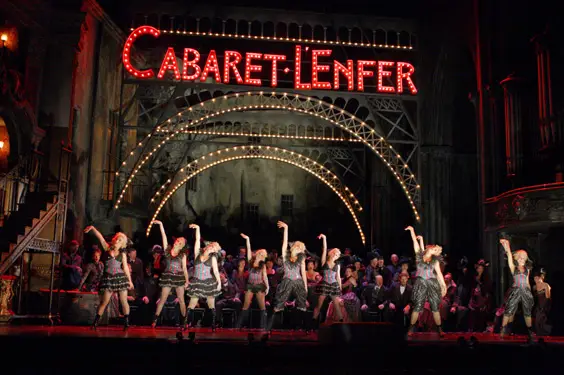
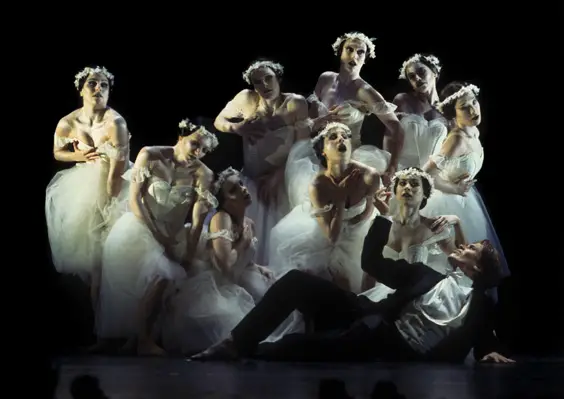
![Lucrezia Borgia [ETO] – Review – Sheffield Lyceum](https://www.on-magazine.co.uk/wp-content/uploads/Lucrezia-Borgia-ETO-–-Review-–-Sheffield-Lyceum-150x100.jpg)
![La Traviata [Opera North] – Review – Leeds Grand Theatre main](https://www.on-magazine.co.uk/wp-content/uploads/La-Traviata-Opera-North-–-Review-–-Leeds-Grand-Theatre-main-150x100.jpg)
